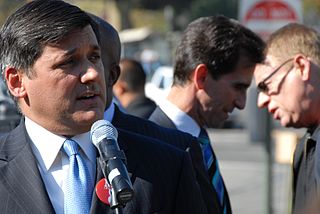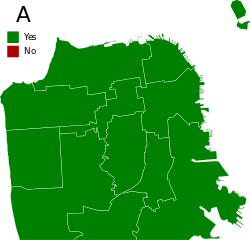
The November 2008 San Francisco general elections were held on November 4, 2008 in San Francisco, California. The elections included seven seats to the San Francisco Board of Supervisors, one seat to the San Francisco County Superior Court, and twenty-two San Francisco ballot measures.

The 2002 San Francisco Board of Supervisors elections occurred on November 5, 2002, with runoff elections held on December 10, 2002. Five of the eleven seats were contested in this election. Three incumbents ran for reelection, while two sought another office.

The November 2007 San Francisco general elections were held on November 6, 2007 in San Francisco, California. The elections included those for San Francisco mayor, district attorney, and sheriff, and eleven San Francisco ballot measures.

The 2000 San Francisco Board of Supervisors elections occurred on November 7, 2000, with a runoff election held on December 12, 2000. All eleven seats were contested. Elections to odd-numbered districts were to four-year terms, while elections to even-numbered districts were to transitional two-year terms, then four-year terms thereafter.

The November 2006 San Francisco general elections were held on November 7, 2006 in San Francisco, California. The elections included five seats to the San Francisco Board of Supervisors, positions for San Francisco assessor-recorder and public defender, and eleven San Francisco ballot measures.

The June 2006 San Francisco general elections were held on June 6, 2006, in San Francisco, California. The elections included one seat to the San Francisco County Superior Court and four San Francisco ballot measures.

The November 2005 San Francisco general elections were held on November 8, 2005, in San Francisco, California. The elections included eight California ballot propositions as part of a special election, those for San Francisco assessor-recorder, city attorney, and treasurer, and nine San Francisco ballot measures.

The 2010 San Francisco Board of Supervisors elections were held on November 2, 2010. Five of the eleven seats of the San Francisco Board of Supervisors were contested in this election. Four incumbents were termed out of office, while one ran for reelection.

The November 2004 San Francisco general elections were held on November 2, 2004, in San Francisco, California. The elections included seven seats to the San Francisco Board of Supervisors, four seats to the San Francisco Community College Board, four seats to the San Francisco Board of Education, and fourteen San Francisco ballot measures.

The November 2010 San Francisco general elections was held on November 2, 2010, in San Francisco, California. The elections included five seats to the San Francisco Board of Supervisors, a runoff election for a seat on the San Francisco County Superior Court, assessor-recorder, public defender, and fifteen San Francisco ballot measures.

The November 2011 San Francisco general elections were held on November 8, 2011 in San Francisco, California. The elections included those for San Francisco mayor, district attorney, and sheriff, and eight ballot measures.

The November 2012 San Francisco general elections were on November 6, 2012, in San Francisco, California. The elections included six seats to the San Francisco Board of Supervisors, four seats to the San Francisco Board of Education, four seats to the San Francisco Community College Board, and seven San Francisco ballot measures.

The 2012 San Diego City Council election occurred on November 6, 2012. The primary election was held on June 5, 2012. This was the first San Diego City Council election to use nine council districts. Five of the nine seats were contested. Two incumbents ran for reelection in their same district and one ran for election in the newly created ninth district.

The November 2013 San Francisco general elections were held on November 5, 2013, in San Francisco, California. The elections included one seat on the San Francisco Board of Supervisors, assessor-recorder, city attorney, and treasurer; and four ballot measures.

In California state elections, 2014 was the first year in which the top statewide offices were elected under the nonpartisan blanket primary, pursuant to Proposition 14, which passed with 53% voter approval in June 2010. Under this system, which first went into effect during the 2012 election year, all candidates will appear on the same ballot, regardless of party. In the primary, voters may vote for any candidate, regardless of their party affiliation. The top two finishers, regardless of party, then advance to face each other in the general election in November.

The 2015 San Francisco mayoral election took place on November 3, 2015, to elect the Mayor of San Francisco, California. Incumbent Mayor Ed Lee won re-election to a second term in office.

The November 2016 San Diego general elections were on November 8, 2016, in San Diego, California. Although the June primary election is referred to as a primary, it functions as a general election. Races that result in no candidate receiving the majority of votes in the June election, advance to the November run-off election. This method changed after Measure K was passed by voters to advance the top-two candidates for mayor, city attorney, or council member to the November general election, regardless of the number of votes either candidate has.

The June 2012 San Diego primary elections were on June 5, 2012, in San Diego, California. A two-round system was used for the election, starting with a primary in June followed by a November runoff election between the top-two candidates if no candidate received a majority of the votes in the first round.

The June 2010 San Diego primary elections were on June 8, 2010, in San Diego, California. Municipal elections in California are officially non-partisan, although most members do identify a party preference. A two-round system was used for the election, starting with a primary in June followed by a November runoff election between the top-two candidates if no candidate received a majority of the votes in the first round.

The 2018 San Francisco Board of Supervisors elections will choose members for five of the eleven seats of the San Francisco Board of Supervisors. One of the seats elections was a special election held on June 5, while the other four will be decided on the November 6, the day of the general election. Two incumbents were termed out of office and three ran for reelection. Municipal elections in California are officially non-partisan, though most candidates in San Francisco do receive funding and support from various political parties. The election will be held using ranked-choice voting.














